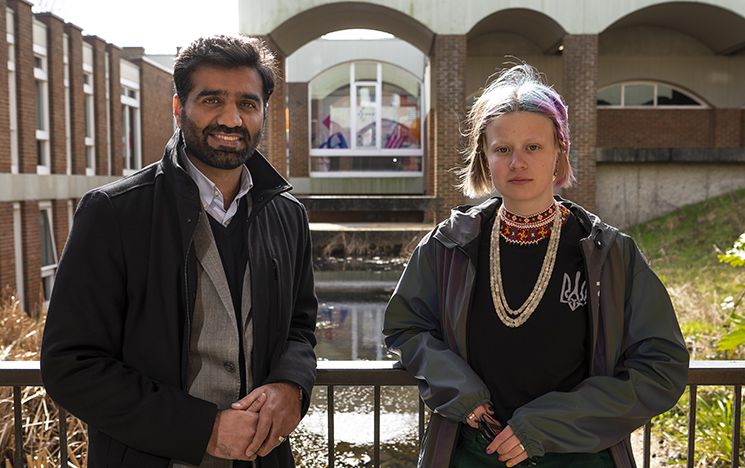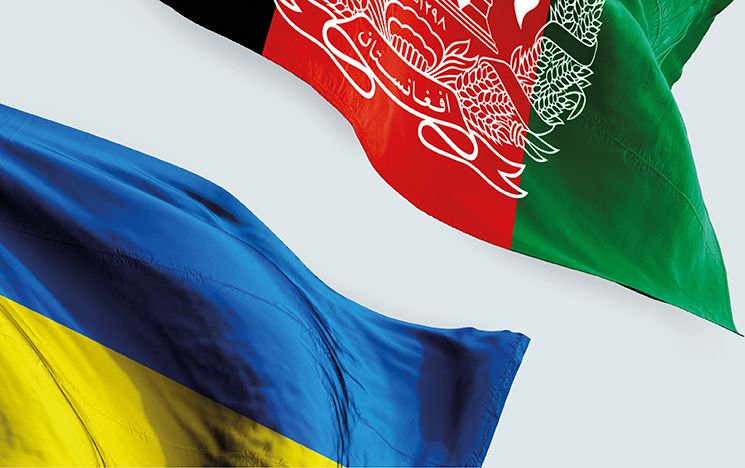A new future
In the summer of 2021, Naimat Zafary and his family fled war in their home country of Afghanistan. Naimat arrived at Sussex as a Chevening scholar and a refugee. Having completed his Masters, Naimat is currently undertaking a PhD in International Development within the School of Global Studies. Violetta Korbina was already a final-year Physics undergraduate at Sussex when Russia invaded her homeland of Ukraine in February 2022. Violetta is now working towards an MSc in Astronomy while finding ways to support her family and wider community living through war.
How are you finding this academic year at Sussex?
VIOLETTA KORBINA: I’m still struggling a lot mentally, but this year is a little easier than the last, as I’m able to focus more on my study and research. I’m learning to cope despite how hard it can be.
NAIMAT ZAFARY: It’s better than last year, which was a hectic, awful situation trying to deal with the news coming out of Afghanistan, the banning of school for girls and the difficulties for my siblings and friends, all while setting up my scholarship and moving so suddenly. This year is more peaceful and I’m able to focus on my research.
What are your plans for your time at Sussex? How might your studies help your country one day?
NZ: I believe my country will remain dependent on international aid until it becomes economically stable, so my plan is to find a best approach for using aid in Afghanistan to benefit its people and eradicate poverty.
VK: I aim to get my Masters, however, my academic life is less tied to what I do for Ukraine. That said, I will be taking a Machine Learning module, and considering Ukraine
is becoming more of a tech hub, I will be able to bring more money in to help to rebuild the war-torn country.
Have your hopes for the future changed in the past year?
VK: Originally I thought I would leave Ukraine, obtain a degree in the UK and stay in the
EU to pursue an academic career. Now I’m considering how I can use my studies to help my home, either working remotely in academia from Ukraine, or applying my Machine Learning skills to get an IT job. I hope I will be able to go home to see my family. I haven't returned to Ukraine for a year.
NZ: When applying for my scholarship, I was asked “What will you do when you return to your home country?”. My response is no longer an option. I can’t go home for now, and the ministry that I planned to work at isn’t there anymore. So, now I am focusing on my PhD and trying to be hopeful.
What has been your biggest learning from the past year?
NZ: In relation to my studies on governance, I’ve learnt the importance of hearing people’s voices and letting them participate in decision making.
VK: For me, it’s finding that people get used to war in strange ways. In Ukraine, the absence of air raid sirens is now causing anxiety. On a personal level, even though I haven’t lived through the shelling, I struggle with loud noises like fireworks and planes.
How do you feel about your homeland?
NZ: I miss my home badly and feel the future is unclear. I left my sister behind, who is in her final year of medical school, and now they won’t issue her certification. You work
for decades as part of the system and suddenly it’s taken away.
VK: I feel sad and miss home, but I feel angry and want justice too. It’s partly anger at the way Ukraine has been treated for the past 400 years. I don’t think conversations around decolonisation focus enough on the impact of the russian empire [sic].
Is there anything you would like to say to Sussex alumni and supporters?
NZ: I’d like to thank them for the incredible support they have shown for Afghan students. I think the world must know how important education is for us. People often hide their failures, but I will happily say that I applied for the Chevening scholarship for six years before being accepted. Education is a way for me to get rid of the darkness in my life, in my country.
VK: I want to say thank you. Considering our University’s radical and activist reputation, I also think it’s important that alumni and students continue to take that forward, such as volunteering, not using products made or sold in russia [sic] and donating money through United24. I hope by giving my personal perspective it might help people to better understand, and to remind people that the war isn’t over. I’m also trying to launch a programme called Books for Ukraine, asking UK universities to donate books to Ukrainian universities. We’ve already shipped the first batch from Sussex.
 Naimat Zafary and Violetta Korbina in front of the Arts pond
Naimat Zafary and Violetta Korbina in front of the Arts pond
Campus life
Favourite place on campus?
Naimat Zafary: Library Square is my beautiful spot.
Violetta Korbina: The Deli. I spent most of my foundation and first year in there, before lockdown. I like my supervisor’s office a lot too.
Favourite aspects of Brighton or the surrounding area?
NZ: I find the people welcoming. I live in Hove and the people are friendly.
VK: Living next to water. I grew up next to a river, so water is quite grounding for me. I also think there's more room for self-expression here.
What do you like to do outside of your studies?
NZ: I play professional cricket with Lewes Cricket Club in the Sussex Cricket League. And I watch TV with my family because I have my kids with me.
VK: Volunteering keeps my hands busy. I recently loaded up a van with items to send to Ukraine and had to fill in the customs declaration (not much fun). I volunteer as a translator at local church events, and I’m involved in science outreach on campus too. I also like keeping local wild birds fed.
As a University of Sanctuary, Sussex strives to provide access to an academic future for all students and a warm welcome to those who seek sanctuary. Through the contributions our alumni and friends make to the Sussex Fund, we can provide hardship funding and welfare support when our students need it most.
